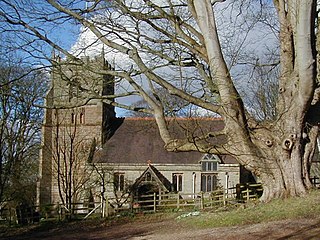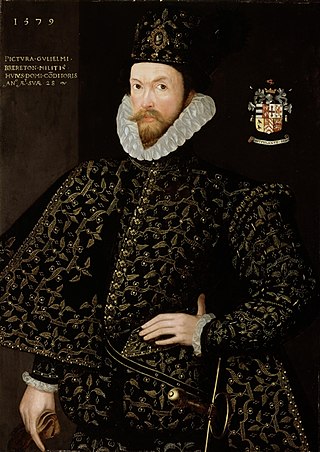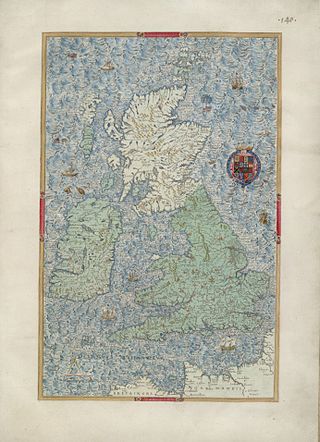Related Research Articles
Barnabe Googe, also spelt Barnabe Goche and Barnaby Goodge, was a poet and translator, one of the earliest English pastoral poets.
Thomas Norton was an English lawyer, politician, writer of verse, and playwright.
Jasper Heywood was an English Jesuit priest. He is known as the English translator of three Latin plays of Seneca, the Troas (1559), the Thyestes (1560) and Hercules Furens (1561).

Edmund Plowden was a distinguished English lawyer, legal scholar and theorist during the late Tudor period.
Sir Robert Bell SL of Beaupré Hall, Norfolk, was a Speaker of the House of Commons (1572–1576), who served during the reign of Queen Elizabeth I.

Beoley is a small village and larger civil parish north of Redditch in the Bromsgrove District of Worcestershire. It adjoins Warwickshire to the east. The 2021 census gave a parish population of 984, mostly at Holt End. The parish includes the hamlet of Portway, adjacent to the A435 road. It adjoins the Redditch suburb of Church Hill and the civil parishes of Alvechurch, Tanworth-in-Arden, Mappleborough Green and Wythall.
Armagil Waad was a chief clerk of the Privy Council, servant of government and an English parliamentarian.
Thomas Blundeville was an English humanist writer and mathematician. He is known for work on logic, astronomy, education and horsemanship, as well as for translations from the Italian. His interests were both wide-ranging and directed towards practical ends, and he adapted freely a number of the works he translated.
Sir Hercules Underhill (1581–1658) was the son of William Underhill of Warwickshire, owner of New Place in Stratford-Upon-Avon. William Underhill sold New Place to William Shakespeare in 1597, and Hercules Underhill confirmed the sale in 1602.

Sir Robert Throckmorton, KG, of Coughton Court in Warwickshire, was a Member of Parliament and a distinguished English courtier. His public career was impeded by remaining a Roman Catholic.
William Fleetwood was an English lawyer and politician. He was Member of Parliament for Marlborough in 1558, Lancaster in 1559 and 1567, and for the City of London several times between 1572 and 1592, but his most significant position was as Recorder of London from 1571 to 1591. A lawyer of the Middle Temple, he was a Queen's Serjeant in 1592.
John Bavant or Bavand alias Clarke was an English Roman Catholic priest. He was a well-respected teacher and scholar at Oxford, and served as the rector of Solihull during the 1560s, but eventually converted to Roman Catholicism and led the rest of his long life as an active missionary and ecclesiastical administrator.

William Brereton, 1st Baron Brereton was an English politician who sat in the House of Commons at various times between 1597 and 1622. He was created a peer in the Peerage of Ireland in 1624 as Baron Brereton.

Charles Ambler was an English barrister and politician who sat in the House of Commons between 1769 and 1790.
James Wright (1643–1713), was an antiquary and writer, author of a county history of Rutland (1684), and the Historia Histrionica (1699), an account of theatre in England in the seventeenth century.

Reginald Corbet was a distinguished lawyer in four reigns across the mid-Tudor period, and prospered throughout, although he seems to have been firmly Protestant in sympathy. He was appointed serjeant-at-law and Justice of the King's Bench, and represented Much Wenlock in the parliament of 1542 and Shrewsbury in those of 1547, October 1553 and 1555. He enjoyed great wealth, partly because his wife was an heiress of Sir Rowland Hill, the first Protestant Lord Mayor of London.
Ralph Sheldon (1623–1684) was an English Roman Catholic Royalist and an antiquary. In his will he bequeathed his library and manuscripts to the College of Arms, his country's authority over heraldry and pedigree.

William Bowyer was an antiquary and government official who was a Member of Parliament and Keeper of the Records in the Tower of London early in the reign of Elizabeth I of England. He was the first Keeper to systematically organise and catalogue the store of government records maintained in the Tower. An avid collector of old manuscripts, he also created Heroica Eulogia, a compilation of grants and verse eulogies relating to the earls of Leicester, along with satirical verses and illustrations, for presentation to Robert Dudley, Earl of Leicester.
Thomas Peend or Delapeend was a Tudor poet and lawyer. He is chiefly remembered as the author-translator of A Pleasant Fable of Hermaphroditus and Salmacis (1565).

Thomas Bavand (1600–1643) was an English barrister, who was appointed a judge in Ireland, but died before he could take up his office.
References
- ↑ There are one or two very brief biographical notices of Bavand : (1) John Hutchinson, 'Bavand or Bavande, William : Writer’, in : A Catalogue of Notable Middle Templars (London 1902), p. 14; (2) A. H. Bullen, ‘Bavand, William (fl. 1559)’ @ DNB; (3) Ross Kennedy, ‘Bavand, William (fl. 1559)’ @ ODNB.
- ↑ ‘Will of William Bavand of Stoke Albany, Northamptonshire’ in : The National Archive @ TNA PROB 11/57/250.
- ↑ Charles Trice Martin, ed. Minutes of Parliament of the Middle Temple, vol. I (London 1904), p. 112.
- ↑ Martin, p. 115. Cf. M. N. and P. W. Hasler, ‘BOWYER, Thomas (1537—95), of Leythorne, Suss.’, in : History of Parliament Online.
- ↑ Martin, pp. 132, 134, 170, 196.
- ↑ Nina Green, THE NATIONAL ARCHIVES PROB 11/53/79 [will of William Sheldon, d. 1570], p. 28 @ The Oxford Authorship Site.
- ↑ ‘Smithe, Henry (1564—1584)’, in : Clergy of the Church of England Database @ Person ID 29527.
- ↑ S. M. Thorpe and Alan Davidson, ‘SHELDON, Ralph (c. 1537—1613), of Beoley, Worcs.’, in : History of Parliament Online.
- ↑ William Bavand, trans. Johannes Ferrarius : The Good Ordering of a Commonweal (London 1559) @ EEBO-TCP.
- ↑ Jasper Heywood, trans. Seneca : Thyestes, ed. Joost Daalder (London and New York 1982), p. 11.
![]() This article incorporates text from a publication now in the public domain : "Bavand, William". Dictionary of National Biography . London: Smith, Elder & Co. 1885–1900.
This article incorporates text from a publication now in the public domain : "Bavand, William". Dictionary of National Biography . London: Smith, Elder & Co. 1885–1900.